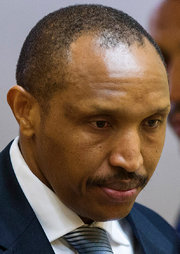Genocide Watch exists to predict, prevent, stop, and punish genocide and other forms of mass murder. Our purpose is to build an international movement to prevent and stop genocide.
Staff Login
War Crimes Trial Opens for Congolese Rebel Leader
War Crimes Trial Opens for Bosco Ntaganda, Congolese Rebel Leader
Marlise Simons, New York Times
2 September 2015
Image: Bosco Ntaganda, center, a Congolese militia leader known as The Terminator, waited for the start of his war crimes trial at the International Criminal Court in The Hague on Wednesday. Credit Pool photo by Michael Kooren
PARIS — Bosco Ntaganda is not the first person accused of war crimes to appear voluntarily before the International Criminal Court, but the former Congolese rebel commander and once powerful crime boss is the first to do so after turning himself in at an American Embassy.
Mr. Ntaganda, 41, a former militia leader whose trial for a multitude of war crimes charges opened on Wednesday, presented himself unannounced at the United States Embassy in Kigali, the Rwandan capital, in March 2013, knowing there was a reward for his arrest on a range of atrocities. It was preferable nonetheless to the prospect of death at the hands of his enemies.
Now in the dock, he is safe, except from the prosecution’s evidence. The chief prosecutor, Fatou Bensouda, will seek to convict Mr. Ntaganda for his brutal campaigns, in which he is accused of terrorizing and killing civilians in the Democratic Republic of Congo’s Ituri region, an area coveted for its mines that yield gold, tungsten and other valuable minerals.
Laying out the case against Mr. Ntaganda, whose arrest was first ordered in 2006, Ms. Bensouda said other rebel groups had committed atrocities in the Ituri fighting. But she singled out Mr. Ntaganda as a notorious and ruthless commander whose conduct raised alarm far beyond the Great Lakes region of Africa.
She said that he ordered his troops to attack, pillage, rape and kill civilians using guns, machetes and knives, and that numerous towns and villages were razed in order to drive out the population.
“He took advantage of ethnic tensions for his own purposes, to gain power and wealth,” Ms. Bensouda said. “The crimes were not random but carefully planned.”
Among these crimes, she said, was the evidence that “he recruited hundreds of children and used them to kill and to die in the fighting.”
“Girl soldiers were passed around to be used by soldiers and others as they pleased,” she said.
Mr. Ntaganda, once nicknamed The Terminator, looked down as the charges against him were read out in a court full of black-gowned lawyers. He faces 13 counts of war crimes and crimes against humanity relating to attacks in 2002 and 2003, in which thousands died, and five charges related to conscription of children.
As the presiding judge, Robert Fremr, asked Mr. Ntaganda to rise and plead, he stood and said quietly, “I plead not guilty to all the charges.”
More than three million people are believed to have died in Congolese violence since the late 1990s in conflicts over land and political power, often involving warlords from rival ethnic groups who were backed by various domestic power brokers or by neighboring governments.
In the Ntaganda case, the prosecution apparently believes it can be most effective by building on earlier cases involving the fighting in the country’s northeast in 2002 and 2003. Mr. Ntaganda is the fourth person to be prosecuted for atrocities in the Ituri region. His boss, Thomas Lubanga, was convicted by the court in 2012.
But Mr. Ntaganda and his new rebel group, M23, has been seen as playing a dangerous and destabilizing role both at home and abroad for much longer, because of the personal wealth he amassed from mineral smuggling operations and because he had the covert backing of Rwanda.
Stephen J. Rapp, who retired last month as the United States ambassador at large for war crimes issues, said that he had made the arrest of Mr. Ntaganda “a priority for the U.S.” and that he and European diplomats had pressed the Rwandan government, which was backing him, to cut its ties.
Mr. Rapp said that by early 2013, the warlord’s political and military base was crumbling and he had made numerous enemies. He had lost a power struggle with his followers and ended up in a firefight with his own men, Mr. Rapp said. Rwanda told Mr. Ntaganda it could no longer protect him, and he feared for his safety. At the same time, it became known that the United States had offered a reward for his capture.
“He had reason to fear that his former comrades would try to collect the prize on his head,” Mr. Rapp said. “When he walked into our embassy in Kigali, he had no place left to go.”
Although the United States is not a member country of the international court, it worked with tribunal officials to ensure Mr. Ntaganda’s speedy passage to detention in The Hague, said Mr. Rapp, who was involved in the arrangements.
The prosecution said it planned to present ample evidence and bring 80 witnesses to support its case. The trial is expected to go on for many months. On Thursday, the defense will present its case and Mr. Ntaganda himself is expected to make a statement.
Copyright: New York Times 2015
























































